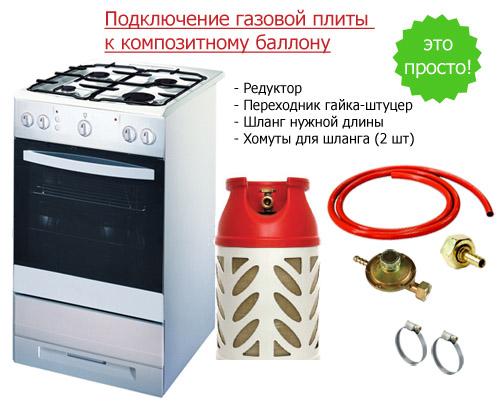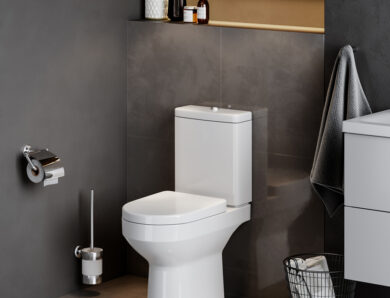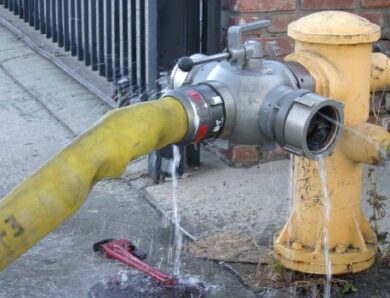
How to connect a gas stove to a cylinder
For various reasons, it is sometimes necessary to use a gas stove there, where there is no centralized gas supply. Example, you took the old stove to the country, and want to use it there, but there is no gas in the house. In this case, rescue cylinders with liquefied fuel, users are only interested in one question: how to properly connect a gas stove to a replaceable cylinder, and what you need to buy.

Necessary equipment
The list of everything you need to properly connect a gas cylinder with liquefied blue fuel looks like this.
- A good stove, albeit not new, but all the burners did NOT burn out, objectives.
- Reducer for a cylinder - it is necessary to buy it with a carving and nuts from brass, for fire safety reasons, with a pressure of at least 30 mbar.
- The gas hose must be selected one and a half meters longer than the actual distance to the storage location of the cylinder, to eliminate its tension when connected.
- Various attachments - only for old products, new gas stoves are equipped with everything you need.
- Copper plated tool, so as not to accidentally cut the spark when it falls or breaks the nut (such requirements of the rules of performance of works with gas equipment, and they should not be neglected).
- Ordinary fume tape or linen cloth is suitable for sealing all joints.
- For a propane gas cylinder, it is best to install a special iron box, which must be locked, especially if there are small children in the family.
- After all the work will be needed soap solution, which must process all connectors and each connection, as well as gas stove handles - this is done to detect gas leaks.
Very important! Only a new special hose can be used to connect the propane liquefied gas cylinder to the gas stove, not the old man from the garage: even with proper storage, it can have internal microcracks.
Алгоритм робіт
First of all, we need to decide, where the gas cylinder will be located, there are three types of proper installation.
- Outside the living space, in the yard, in a special metal box - fire inspectors will thank you.
- The first option is not always possible, therefore install a cylinder in the pantry next to the kitchen, and for a hose drill in the general wall an aperture.
- If there is no other place, but only in the immediate vicinity of the plate, then it is placed no closer 1 meters. For safety it is necessary to construct fastenings from a tree or to buy a special case from metal.
Importantly! The rules of use of gas equipment allow you to install a shielded gas tank no closer than half a meter from the stove without additional fences.
More users need to know, that a mixture of propane and butane is pumped into the cylinders, which is heavier than oxygen, and according to the laws of physics, such fractions are able to accumulate in unventilated rooms - so you can not install such equipment in basements.
Joining the plate
This is the safest job, regardless, where it is performed - in the country or in the city's private sector, because the gas is not yet connected, so fear nothing. If there is a threaded connection, then tent on the thread sealed tape and tighten the nut to the stop. Before that it is necessary to check up presence of a ring of a sealant in a nut on a hose, as shown in the photo.
We connect the balloon
All industrial gas stoves are designed to use fuel at low pressure, therefore at connection of a cylinder to a plate the reducer is necessary, which will provide it.
This product is mounted on a cylinder, the thread used is left, therefore it is necessary to turn to the left, rather than the usual scheme for many users. For safety, all nuts and threaded connections are made of brass.
The connection is made by carefully inspecting all the parts:
- there should be no dirt, dust especially on the thread and inside the nut, on the reducer and gas tanks;
- the main attention should be paid to the hose - it should be the required length with a margin, no traces of mechanical damage or cracks, and the service life must correspond to the date of installation;
- the clamps must all be new, it is better to use with an anticorrosive covering, for durability, given the temperature difference in the autumn-winter period.
After the end of works on connection of a cylinder we make visual check of correctness of connection, and only then begin the final stage.
Leak check
Now it's time to use a pre-prepared solution of water and soap. Carefully open the valve on the gas tank - a hiss is heard, which confirms the proper function of the gearbox. Now we take a soft foam sponge soap suds, and apply it to all joints - when bubbles appear, tighten the nuts.
If the foam remains stationary - then, the connection quality is excellent, and worries about nothing, you can turn on the stove and check the resistance of combustion.
Perhaps, insecure home craftsmen will need this video:


